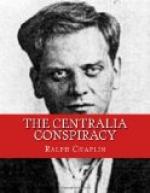“I got worried and I went to the Chief. I says to him ’Are you going to protect my property?’ Hughes says, ’We’ll do the best we can for you, but as far as the wobblies are concerned they wouldn’t last fifteen minutes if the business men start after them. The business men don’t want any wobblies in this town.’”
The day before the tragedy Elmer Smith dropped in at the Union hall to warn his clients that nothing could now stop the raid. “Defend it if you choose to do so,” he told them. “The law gives you that right.”
It was on the strength of this remark, overheard by the stool-pigeon, Morgan, and afterwards reported to the prosecution, that Elmer Smith was hailed to prison charged with murder in the first degree. His enemies had been certain all along that his incomprehensible delusion about the law being the same for the poor man as the rich would bring its own punishment. It did; there can no longer be any doubt on the subject.
[Illustration: Carting Away Wesley Everest’s Body for Burial
After the mutilated body had been cut down in laid in the river for two days. Then it was taken back to the city jail where it remained for two days more—as an object lesson—in plain view of the comrades of the murdered boy. Everest was taken from this building to be lynched. During the first week after the tragedy this jail witnessed scenes of torture and horror that equaled the worst days of the Spanish inquisition.]
The Scorpion’s Sting
November 11th was a raw, gray day; the cold sunlight barely penetrating the mist that hung over the city and the distant tree-clad hills. The “parade” assembled at the City Park. Lieutenant Cormier was marshal. Warren Grimm was commander of the Centralia division. In a very short time he had the various bodies arranged to his satisfaction. At the head of the procession was the “two-fisted” Centralia bunch. This was followed by one from Chehalis, the county seat, and where the parade would logically have been held had its purpose been an honest one. Then came a few sailors and marines and a large body of well dressed gentlemen from the Elks. The school children who were to have marched did not appear. At the very end were a couple of dozen boy scouts and an automobile carrying pretty girls dressed in Red Cross uniforms. Evidently this parade, unlike the one of 1918, did not, like a scorpion, carry its sting in the rear. But wait until you read how cleverly this part of it had been arranged!
The marchers were unduly silent and those who knew nothing of the lawless plan of the secret committee felt somehow that something must be wrong. City Postmaster McCleary and a wicked-faced old man named Thompson were seen carrying coils of rope. Thompson is a veteran of the Civil War and a minister of God. On the witness stand he afterwards swore he picked up the rope from the street and was carrying it “as a joke.” It turned out that the “joke” was on Wesley Everest.




